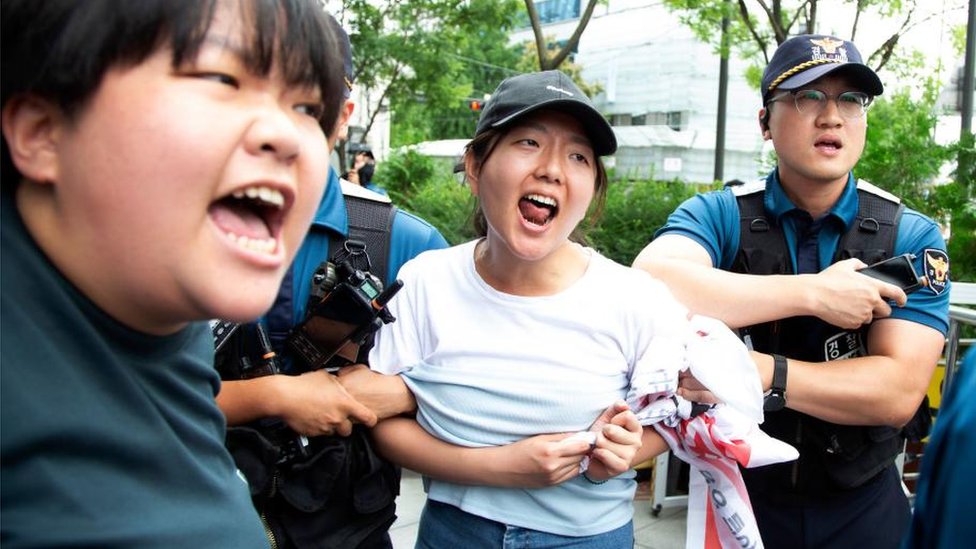Bbc japan nuclear water
Japan has begun releasing treated radioactive water from its damaged Fukushima power plant into the Pacific Ocean - 12 years after a nuclear meltdown. That's despite China bbc japan nuclear water a ban on Japanese seafood and protests in Japan itself and South Korea. The UN's atomic regulator says the water will have "negligible" radiological impact on people and the environment. An earthquake followed by a tsunami in wrecked the nuclear power plant, bbc japan nuclear water, destroying its cooling system and causing reactor cores to overheat and contaminate water within the facility with highly radioactive material.
Japan will start releasing treated radioactive water from the tsunami-hit Fukushima nuclear plant into the Pacific Ocean on Thursday, despite opposition from its neighbours. The decision comes weeks after the UN's nuclear watchdog approved the plan. Some 1. The water will be released over 30 years after being filtered and diluted. Authorities will request for the plant's operator to "promptly prepare" for the disposal to start on 24 August if weather and sea conditions are appropriate, Japan's Prime Minister Fumio Kishida said on Tuesday after a Cabinet meeting. Mr Kishida had visited the plant on Sunday, prompting speculation the release was imminent.
Bbc japan nuclear water
.
Experts say the waste water could be carried by ocean currents, particularly the cross-Pacific Kuroshio current.
.
Japan has begun releasing treated radioactive water from its damaged Fukushima power plant into the Pacific Ocean - 12 years after a nuclear meltdown. That's despite China slapping a ban on Japanese seafood and protests in Japan itself and South Korea. The UN's atomic regulator says the water will have "negligible" radiological impact on people and the environment. An earthquake followed by a tsunami in wrecked the nuclear power plant, destroying its cooling system and causing reactor cores to overheat and contaminate water within the facility with highly radioactive material. Since the disaster, power plant company Tepco has been pumping in water to cool down the reactors' fuel rods.
Bbc japan nuclear water
Japan will start releasing treated radioactive water from the tsunami-hit Fukushima nuclear plant into the Pacific Ocean on Thursday, despite opposition from its neighbours. The decision comes weeks after the UN's nuclear watchdog approved the plan. Some 1. The water will be released over 30 years after being filtered and diluted. Authorities will request for the plant's operator to "promptly prepare" for the disposal to start on 24 August if weather and sea conditions are appropriate, Japan's Prime Minister Fumio Kishida said on Tuesday after a Cabinet meeting.
Juniper elementary redding ca
Fishermen worried about Fukushima nuclear water. American professor Emily Hammond, an expert in energy and environmental law with George Washington University, said: "The challenge with radionuclides such as tritium is that they present a question that science cannot fully answer; that is, at very low levels of exposure, what can be counted as 'safe'? In , a tsunami triggered by a magnitude 9. And fishermen have told the BBC they fear their reputation has been permanently damaged and worry for their jobs. Experts also note that the contaminated water is being released into a massive body of water, the Pacific Ocean. But some scientists say we cannot predict the impact of releasing the water. But many people who are exposed to the Pacific Ocean every day have concerns. This video can not be played To play this video you need to enable JavaScript in your browser. What happened at Fukushima 12 years ago? Shortly after, authorities set up an exclusion zone which continued to be expanded as radiation leaked from the plant, forcing more than , people to evacuate from the area. The UN's atomic regulator says the water will have "negligible" radiological impact on people and the environment. China retaliates as Japan releases Fukushima water.
A UN watchdog has said that Japan's plan to release waste water from the tsunami-wrecked Fukushima nuclear plant into the sea complies with international standards. The International Atomic Energy Agency says the release will have a "negligible" impact on the environment. The Fukushima facility is running out of storage space for the water, which was used to cool nuclear reactors.
Nuclear plants around the world regularly release waste water with tritium levels above that of the treated water from Fukushima. James Smith, professor of environment and geological sciences with Portsmouth University, said that "in theory, you could drink this water", because the waste water is already treated when it is stored and then diluted. And marine biologist Robert Richmond, from the University of Hawaii, told the BBC: "We've seen an inadequate radiological, ecological impact assessment that makes us very concerned that Japan would not only be unable to detect what's getting into the water, sediment and organisms, but if it does, there is no recourse to remove it Hong Kong said it would "immediately activate" import curbs on some Japanese food products. But many people, including fishermen in the region, fear that discharging the treated water will affect their livelihoods. Japan has been collecting and storing the contaminated water in tanks for more than a decade, but space is running out. Discharge from Japan nuclear plant safe, tests show. Shortly after, authorities set up an exclusion zone which continued to be expanded as radiation leaked from the plant, forcing more than , people to evacuate from the area. Anxiety and anger over Fukushima nuclear waste plan. By Navin Singh Khadka. But many people who are exposed to the Pacific Ocean every day have concerns. Facts are up against fear in Fukushima. By Kelly Ng. In , a tsunami triggered by a magnitude 9.


I confirm. I join told all above. We can communicate on this theme. Here or in PM.
I apologise, but, in my opinion, you are mistaken. Let's discuss it.
It is remarkable, rather valuable message